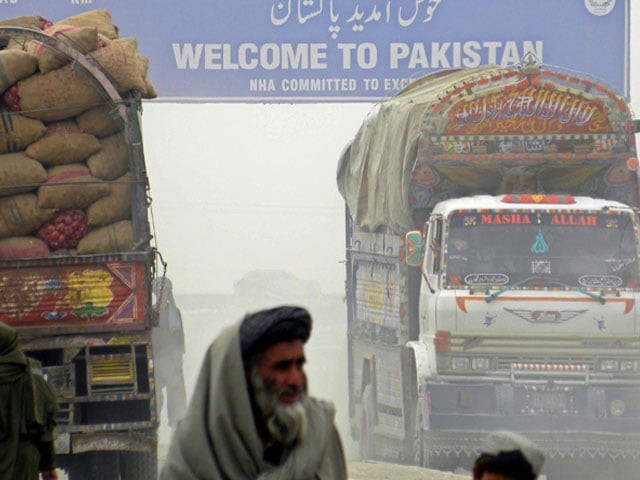Border challenges stall Pakistan-Afghanistan trade
Efforts to boost bilateral commerce hampered by operational and political barriers

Peshawar serves as the gateway to the Pakistan-Afghanistan border, facilitating the import and export of various products. The Torkham border acts as a pathway, enabling the expansion of trade between the two countries on a global scale.
Pakistan and Afghanistan share a border spanning over 2,600 kilometres. Following the implementation of border fencing, illegal movements of goods across the border have been curtailed to some extent.
There are 18 trading points along the Pakistan-Afghanistan border, with key crossing points being Torkham and Chaman. Torkham, situated in Khyber-Pakhtunkhwa, and Chaman, located in Balochistan, are connected to Afghanistan’s Jalalabad and Kandahar provinces respectively.
According to a survey conducted by the Pakistan-Afghanistan Joint Chamber of Commerce, trade between the two countries amounted to $2.5 billion in 2010. However, this figure dropped to $1.6 billion before experiencing a slight increase to over $1.8 billion in 2022-23.
Pakistan’s exports to Afghanistan comprise various categories, including cereals (25%), sugar and sugar confectionery (4%), edible vegetables, roots, and tubers (7%), fruits, nuts, and peels of melons and citrus fruits (15%), salt, sulphur, earth-stones (13%), animal or vegetable fats and oils (7%), plastics and articles thereof (5%), pharmaceutical products (13%), wood and articles of wood, wood charcoal (6%), and iron and steel (5%).
Key potential imports from Afghanistan include figs, grapes, almonds, onions, cumin seeds, apples, beans, cotton, and, notably, rough gemstones.
In Peshawar, there are carpets, plastics, and other utensils labelled as Iranian products but manufactured in Pakistan. Additionally, goods such as oil, petrol, and others smuggled from Iran are sold at lower prices in Peshawar and surrounding areas.
Speaking to The Express Tribune, Shah Jahan Khan, an exporter in Torkham, highlighted the challenges faced by traders operating between Pakistan and Afghanistan. Despite bilateral trade and Afghanistan importing more goods from Pakistan, frequent border closures result in significant financial losses for businesses in both countries.
Sharing his views with The Express Tribune, Jamsheed Khan emphasised the necessity for joint efforts by Pakistan and Afghanistan to address the difficulties faced by traders. He proposed improved border management and bilateral trade discussions involving top officials to enhance economic conditions in both nations.
Former President of the Sarhad Chamber of Commerce and Industry, Zahid Shinwari expressed concerns to The Express Tribune about the decline in Pakistan-Afghanistan trade from $1.5 billion to $5 million. He noted competition from Iran and China, urging authorities to find solutions beneficial to traders in both countries.
He suggested that if the USA and Europe, as well as Iran, Saudi Arabia, India, and Nepal, can engage in trade, there’s no reason why Pakistan and Afghanistan cannot do the same.
President of the Khyber-Pakhtunkhwa Chamber of Commerce and Industry, Fawad Ishaq, urged the governments to ease trade conditions for merchants, highlighting the cultural and religious similarities between the two nations.
Read Businessmen urge opening of more Pak-Afghan borders
He mentioned an agreement among China, Pakistan, and the Afghan Taliban administration to extend the China-Pakistan Economic Corridor (CPEC) to Afghanistan. However, little progress has been made thus far, highlighting the urgent need to accelerate work on the project.
“In our bazaars and shops, Chinese and Iranian products are readily available,” he remarked, pointing to Karhano market where both legally and illegally acquired goods from these countries are sold.
He added that recent operations in the border areas of Iran would also impact Pak-Iran trade, underscoring the need for Pakistan to improve trade relations with both Iran and Afghanistan. He called for collaborative efforts to resolve issues arising from the Torkham border closure, which were causing significant economic losses.
Ziaul Haq Sarhadi, Pakistan-Afghanistan Joint Coordinator for Trade, mentioned the decline in bilateral trade to $80-90 million from the previous $2.5 billion. He highlighted the impact of changing governments in both countries on trade dynamics and suggested addressing issues through mutual dialogue.
He added that before the political changes, the situation was favourable, but since the merger of tribal districts and the implementation of a policing system, truck drivers at the Torkham border have been demanding bribes at checkpoints, leading to dissatisfaction among them.
He noted that the Torkham border had been closed for over ten days, resulting in significant revenue losses, over Rs88 billion, for the governments of both Pakistan and Afghanistan.
He proposed a streamlined visa process for border drivers, suggesting that both the Pakistani and Afghan governments issue red passes to facilitate easier movement. He explained that it was a costly and time-consuming exercise to apply for a visa every time a driver has to make a trip to either country. He cited the Geneva Convention, highlighting the need to provide facilities to Afghans at sea ports and advocating for similar treatment at the Torkham border.
“Most of the market is dominated by Chinese and Iranian products,” Sarhadi remarked, cautioning that if this trend continues, Pakistan may lose Afghanistan as a trading partner.
He underscored the importance of collaborative efforts between Pakistan and Afghanistan, especially in light of the Taliban regime in Afghanistan and the incoming government in Pakistan, to improve border management and bilateral trade.
All stakeholders in conversation with The Express Tribune stressed the importance of cooperative measures, efficient border management, and a conducive trading environment to revitalise the Pakistan-Afghanistan trade relationship and mitigate financial losses.
Published in The Express Tribune, February 23rd, 2024.
Like Business on Facebook, follow @TribuneBiz on Twitter to stay informed and join in the conversation.


















COMMENTS
Comments are moderated and generally will be posted if they are on-topic and not abusive.
For more information, please see our Comments FAQ